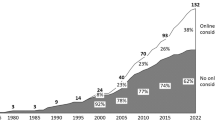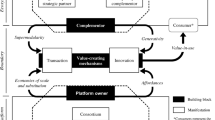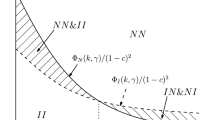Abstract
Product choice and pricing are critical decisions taken by firms while launching new products. Firms need to consider the effect of competition while taking the above decisions. Extensive literature is available for pricing, positioning and launch sequence determination of differentiated products under competition. But, there is need to understand the leader-follower behaviour of firms with differentiated products. The classical game theoretic models do not consider bounds on prices. Hence, applying these models for product choice and pricing decisions in a real-life industrial setting may result in infeasible product choices and generate misleading results. To overcome this gap between theory and practice, we develop game theoretic models for sequential decision making by two firms using reservation price as upper bound on prices by formulating it as a quadratic programming problem. Our approach generates interesting insights on the competitive behavior of firms and shows that leaders can indeed enjoy first-mover advantage under certain conditions.
Similar content being viewed by others
References
Amir, R., Stepanova, A.: Second-mover advantage and price leadership in Bertrand duopoly. Game Econ. Behav. 55(1), 1–20 (2006)
Besanko, D., Winston, W.L.: Optimal Price Skimming by a Monopolist facing Rational Customers. Manag. Sci. 36(5), 555–567 (1990)
d’Aspremont, C., Jaskold Gabszewicz, J., Thisse, J.-F.: On Hotelling’s Stability in Competition. Econometrica 477(1145–1150) (1979)
Dixit, A.: A model of duopoly suggesting theory of entry barriers. Bell J. Econ. 10(20–32) (1979)
Gal-or, E.: First and Second Mover Advantages. Int. Econ. Rev. 26(3), 649–653 (1985)
Griffiths, W.E., Skeels, C.L., Chotikapanich, D.: Sample size requirements for estimation in SUR models. http://fbe.unimelb.edu.au/__data/assets/pdf_file/0003/805917/794.pdf (2001). Accessed 17 Apr 2014
Haruvy, E.E., Miao, D., Stecke, K.E.: Various strategies to handle cannibalization in a competitive duopolistic market. International Transactions in Operational Research. (2012)
Hotelling, H.: Stability in Competition. Econ. J. 39(41–57) (1929)
Jedidi, K., Zhang J.Z.: Augmenting Conjoint Analysis to Estimate Consumer Reservation Price. Manage. Sci. 48(10), 1350–1368 (2002)
Kadiyali, V., Sudhir K., Rao, V.R.: Structural analysis of competitive behaviour: New Empirical Industrial Organization methods in marketing. Int. J. Res. Mark. 18, 161–186 (2001)
Klemperer, P: Equilibrium Product Lines: Competing head-to-Head May be Less Competitive. Am. Econ. Rev. 740–755 (1992)
Moorthy, Sridhar K. Using Game Theory to Model Competition. J. Mark. Res. 22, 265–282 (1985)
Moorthy, S.K.: Product and Price Competition in a Duopoly. Mark. Sci. 7(2), 141–168 (1988)
Noble, P.M., Gruca, T.S.: Industrial pricing: Theory and managerial practice. Mark. Sci. 18(3), 435–454 (1999)
Roy, A., Hanssens, D.M., Raju, J.S.: Competitive Pricing by a Price Leader. Manag. Sci. 40(7), 809–823 (1994)
Romp, G.: Game theory: introduction and applications. OUP Catalogue, Oxford (1997)
Singh, N., Vives, X.: Price and quantity competition in a differentiated duopoly. Rand J. Econ. 15(4), 546–554 (1984)
Sudhir, K.: Competitive pricing behavior in the auto market: A structural analysis. Mark. Sci. 20(1), 42–60 (2001)
Author information
Authors and Affiliations
Corresponding author
Rights and permissions
About this article
Cite this article
Chaudhuri, A., Singh, K.N. First mover advantage in launch of platform based variants: a leader-follower game with upper bound on prices. OPSEARCH 52, 42–54 (2015). https://doi.org/10.1007/s12597-014-0174-5
Accepted:
Published:
Issue Date:
DOI: https://doi.org/10.1007/s12597-014-0174-5




